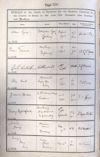JAMES YOUNG
INQUEST AT NEWBURY UPON A HUMAN DERELICT
In the absence of Dr. W.B. Heywood, the Borough Coroner, Dr. Parsons held an inquest at the Police Court last (Wednesday) evening, into the circumstances concerning the death of James Young, who was found dead in his bed on Tuesday evening at the Weaver's Arms. The deceased, who was 38 years of age, was a well known figure about the streets. At one time he was employed on the cricket ground, and had the makings of a good natural bowler. But he gradually drifted downhill, until he became a human derelict on the streets, picking up a precarious living for doing odd jobs and securing coppers from sympathisers who knew him in his better days. The immediate cause of death was shown by a post-mortem examination to be a clot of blood in the heart, but there were indications of lack of nourishment, deep-seated disease and neglect. At the inquest, the foreman of the jury was Mr. Lawrence Cleeves, whilst Sergt. Haley acted as Coroner's officer.
The first witness was James Young, the father of the deceased, who stated that he lived in the City. He saw his son on Sunday evening. He did not notice anything unusual about him, nor did the deceased complain. Mrs. Lucy Phillips, landlady of the Weavers' Arms, said that the deceased was in the habit of lodging at the house. He came in about half-past-nine and went straight to bed. He seemed quite cheerful, and all he said was "Good-night". Alfred Seymour, who was staying at the Weavers' Arms, in the next room to Young, said he went to call him on Tuesday morning, and found that he was dead.
Dr. Hickman, who was called in the Weaver's Arms, said that he found that death had taken place several hours. His body was in a filthy state, verminous, and smelt horribly. It was not fit for a human being to live in such a state. Subsequently he made a post mortem examination. Physically the deceased was in a bad condition. The body was badly nourished, there was pleurisy in both lungs, also signs of consumption at the top of the left lung. In one of the chambers of the heart there was a clot of blood, which he believed formed before death. He had a regular nutmeg liver; a drinker's liver added the doctor, and it was much enlarged. The stomach was practically empty. The immediate cause of death, he should think, was the clot of the blood to the heart. The jury returned a verdict that death resulted from this cause.
Newbury Weekly News 13 September 1913
Not in Mrs P. Buried from the Weaver's Arms 19 Sept 1913 Bk 1899 p. 250 no. 9199 Aged 38 |



